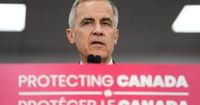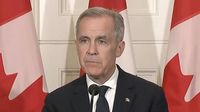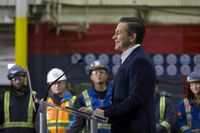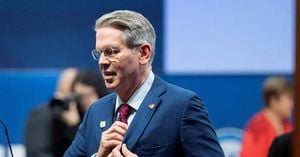As trade tensions with the United States continue to escalate, Liberal Leader Mark Carney has introduced a new initiative to encourage Canadians to explore their own country this summer. On April 12, 2025, Carney unveiled the "Canada Strong Pass," a program aimed at making local vacations more accessible for families and young people.
Carney's announcement comes at a time when U.S. President Donald Trump has been vocal about his stance on trade, which Carney claims threatens both the Canadian economy and sovereignty. In his statement, Carney emphasized the importance of unity among Canadians, saying, "At a time when our economy is under attack from President Trump, Canadians are stepping up — helping our neighbours, buying local, and celebrating our beautiful country."
The Canada Strong Pass will be available from June to August 2025, providing free access to national galleries and museums for children and teens under 18. Additionally, those traveling with their parents will be able to ride VIA Rail trains at no cost. Young Canadians aged 18 to 24 will also benefit from discounted access and fares, making it easier for them to experience Canada's rich cultural offerings.
As part of this initiative, the Liberal government has also committed to reducing camping fees in national parks during the same period. This measure aims to encourage families to enjoy the great outdoors and explore Canada's natural beauty.
In a broader context, Carney's initiative aligns with a previous announcement that all national parks and historic sites will be free to the public this summer. He stated, "Whether it’s trips to national parks and historic sites, spending the day at a national art gallery or museum, or hiking Canadian trails, my new government will help the next generation discover all Canada has to offer this summer." This sentiment reflects a growing desire among Canadians to engage with their country, especially in light of ongoing geopolitical challenges.
Meanwhile, Conservative Leader Pierre Poilievre was also active on the campaign trail, pledging to cut red tape and enhance support for military veterans. Speaking at a press conference in Nepean, a suburban area in Ottawa, Poilievre announced that his party would ensure automatic approval of military veterans' disability applications if they are not processed within four months. This promise comes in response to long-standing complaints from veterans regarding delays in receiving benefits.
Poilievre noted, "Veterans that have sacrificed so much to defend our country deserve to have us all championing them. In return for that sacrifice, Canada’s veterans deserve a government that fights for them. That’s a core part of the Canadian promise. But after the lost Liberal decade, the government has failed our veterans." The Conservative leader highlighted that Veterans Affairs Canada has struggled to meet its target of processing disability claims within 16 weeks, achieving this standard only 69 percent of the time in the previous year.
In addition to his commitment to veterans, Poilievre promised to provide veterans with control over their medical records and to implement a standardized system for military doctors to assess injuries. He also pledged to ensure that veterans can obtain service dogs for post-traumatic stress disorder and to make educational and training benefits available to Armed Forces members as soon as they receive their release date.
As the election approaches, the political landscape remains competitive. NDP Leader Jagmeet Singh is actively campaigning in Timmins, Ontario, with a public event scheduled for the same evening as Carney's announcement. All three leaders are gearing up for televised debates scheduled for April 16 and 17, 2025, in Montreal, where they will have the opportunity to present their platforms to a wider audience.
In a related development, Bloc Québécois Leader Yves-François Blanchet criticized Carney for allegedly neglecting the needs of aluminum sector workers in Quebec. Blanchet urged the federal government to allocate funds from retaliatory tariffs imposed on the United States to support this industry, arguing that Carney's focus has been disproportionately on Ontario's automotive sector.
As the April 28 election date draws near, the Canada Strong Pass initiative and Poilievre's commitments to veterans are just two examples of how the political parties are attempting to resonate with Canadian voters. The stakes are high, and both leaders are keenly aware that their proposals could significantly influence the outcome of the election.
In summary, the Canada Strong Pass represents a concerted effort by the Liberal Party to foster a sense of national pride and encourage domestic tourism amid external pressures. With both the Liberals and Conservatives making significant pledges to the electorate, the coming days will be crucial as Canadians prepare to make their voices heard at the polls.






